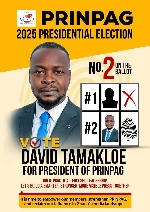NPP lost 2024 election because of bad economic practices– Razak Kojo Opoku
 Dr Razak Kojo Opoku
Dr Razak Kojo Opoku
Political analyst and Founding President of the UP Tradition Institute, Dr. Razak Kojo Opoku, has dismissed suggestions that the controversial SSNIT-Rock City hotel partnership deal played a decisive role in the New Patriotic Party’s (NPP) 2024 electoral defeat.
According to Dr. Opoku, the NPP’s loss was largely due to Ghana’s worsening economic conditions, including the depreciation of the cedi, high inflation, the Domestic Debt Exchange Programme (DDEP), and rising costs of living.
He argued that “the genuine intentions” of Rock City Hotel, owned by former Food and Agriculture Minister Bryan Acheampong, to partner with SSNIT in managing its hotels could not be blamed for the party’s downfall.
Dr. Opoku, also a founding member of the party, cited remarks made by former Vice President and 2024 presidential candidate Dr. Mahamudu Bawumia in April 2025, attributing the NPP’s loss to:
The unpopular E-Levy policy.
The Domestic Debt Exchange Programme (DDEP) and its impact on ordinary Ghanaians.
Rising cost of living and fuel price hikes.
Non-payment of NABCO staff, school feeding caterers, and other workers.
The $58 million National Cathedral controversy.
Perceptions of arrogance and the government’s unwillingness to listen to public concerns.
Beyond Bawumia’s assessment, Dr. Opoku added other major factors such as the steep depreciation of the cedi from GHS4 to GHS17 per US dollar, high interest rates, illegal mining (galamsey), broken relations with the media, and unmet infrastructure promises, particularly in the Ashanti Region.
Addressing criticism of the proposed sale of 60% SSNIT stake in four state-owned hotels to Rock City Hotel, Dr. Opoku emphasised that Public-Private Partnerships (PPPs) are fully legal under Ghana’s laws.
He noted that Parliament passed the Public-Private Partnership Act, 2020 (Act 1039), to guide such projects, and SSNIT followed due process by advertising internationally and shortlisting companies through competitive tendering.
Rock City Hotel, he said, emerged as the top candidate after technical and financial evaluations.
However, the process stalled after a petition to the Commission on Human Rights and Administrative Justice (CHRAJ) prompted Rock City to withdraw, citing politically motivated attacks on its owner.
Dr. Opoku also referenced previous arrangements in which foreign investors took control of state-owned hotels without attracting the same level of political controversy.
In 2006, Saudi Prince Alwaleed bin Talal partnered with the government to redevelop the Ambassador Hotel, now Mövenpick Ambassador Hotel.
In 2008, the Ghana-Libyan Arab Holding Company (GLAHCO) took over Kumasi City Hotel and Accra City Hotel, later leasing them to Achour Holdings of Lebanon.
During the Rawlings era, the Divestiture Implementation Committee (DIC) sold more than 60 state companies to private entities, including GLAHCO.
“Why then should Bryan Acheampong’s Rock City, after going through all the prescribed procurement processes, be treated differently?” Dr. Opoku questioned.
Dr. Opoku stressed that the NPP’s defeat in 2024 stemmed from economic hardship, policy missteps, and governance issues, not the SSNIT-Rock City Hotel partnership.
He maintained that Acheampong’s intentions to inject capital into SSNIT’s hotels through a PPP “can never be considered” a major factor in the party’s electoral downfall.
Source: classfmonline.com/Cecil Mensah
Trending News

Police arrest man with pump action gun and cartridges at Akwatia
13:51
Majority Chief Whip slams GBA over 2025 annual conference speakers list
19:40
Vice President reaffirms Ghana–UN partnership, highlights women’s bank initiative
13:37
PRINPAG holds elections today, David Tamakloe tipped to lead Association
08:13
Treat my earlier statement as a wake-up call-GFL boss urges gov't
07:39
Energy Minister hails progress in Atuabo Gas Plant maintenance
15:28
A/R: Barekese youth petitions Otumfuo to probe chief over alleged galamsey involvement
12:37
Amnesty: Wife of jailed former MASLOC official cries foul over delayed appeal process
06:48
NPP lost 2024 election because of bad economic practices– Razak Kojo Opoku
07:03
Tema East MP Ashai Odamtten motivates WASSCE candidates
15:00



